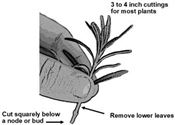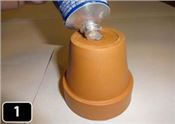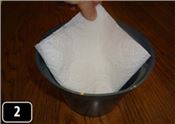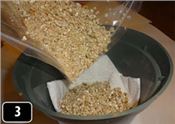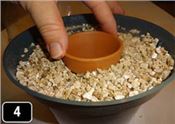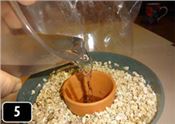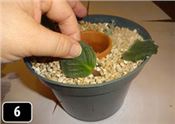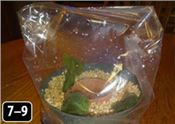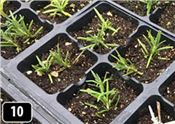Gardening Page
Taking Plant Cuttings
DONNA AUFDENBERG
COLUMBIA, MO.
You can grow new plants from cuttings off existing ones. Learn how to take a cutting and create an environment in which it can develop roots in this illustrated two-page guide.
Supplies
6 to 8 inch clean plastic pot with drain holes
2 to 3 inch clay pot
Paper towel or coffee filter
Silicon adhesive or a cork
Vermiculite
Gallon-size bag to cover forcing pot
Plant cuttings
Directions
Use a silicon sealant to seal the hole in the bottom of the 2 to 3 inch clay pot. Allow to dry overnight. A cork can also be used to block the hole; the pot must hold water.
Fold a paper towel. Place it in the bottom of the plastic pot to block the holes.
Fill plastic pot with vermiculite, leaving ½ inch lip at the top.
Twist the clay pot into the center of the vermiculite so the top lip sticks up above it.
Water the vermiculite thoroughly. Fill the clay pot with water.
Because clay is porous, water will seep through into the vermiculite, keeping the moisture even and allowing cuttings to root.
Make holes 1-inch apart in the vermiculite with a pencil for the cuttings. Place cut-end of cuttings in the holes.
Use a gallon-size bag to cover the forcing pot once you are finished sticking cuttings in the vermiculite. The bag will help to hold moisture and humidity around the cuttings. Take the covering off at least once a day to allow fresh air around cuttings.
Keep the clay pot in the center filled with water. Do not allow the cuttings to dry out.
The bag can be removed after about 1 to 2 weeks depending on cutting types. If wilting occurs after the bag is removed, put the bag back over the cuttings. The cutting need more time in a high humid environment.
Check cuttings weekly by gently removing them and looking for roots.
When adequate roots have formed, transplant into a pot or planting container with potting mix.
How to take a cutting
Cut a 3 to 4 inch cutting off the growing tip of the plant branch just below a node where a leaf is attached.
Remove the leaves from the lower one-third to one-half of the cutting.
Insert the cuttings to one-third of their length into the vermiculite.
Make sure the cut-end is down and the growing point is up. Do not crowd.
Water cutting. Keep cuttings from wilting by covering with a dome or plastic bag.
Cutting edge tips
Use clean containers and cutting tools. Rubbing alcohol or a mixture of 1 part bleach to 9 parts water works well for sanitizing.
Use rooting hormone for more difficult to root plants.
Avoid taking cuttings where blooms are occurring on a plant.
Keep plant cuttings cool and moist until inserted in vermiculite. A plastic bag with a wet paper towel may be used to store cuttings. Keep the bag out of the sun. ∆
DONNA AUFDENBERG: Field Specialist in Horticulture, University of Missouri
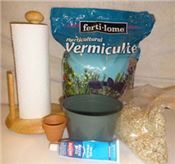
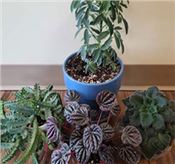
Plants to try: pothos, ivy, coleus, philodendron, African violet, rosemary, succulents, and wandering Jew
